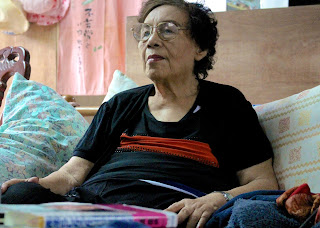The purpose of the trip was to observe and provide assessment of Mrs. Kao's living environment and make recommendation on the extent to which she should be relocated to a better place.
Historical background
The battle of Shuishang Airport (水上機場) of Chiayi County (嘉義) constituted one of the bloodiest confrontation between the Taiwanese, the aborigines and the Kuomintang troops, subsequent to the initial clash on February 28th, 1947. Residents of Chiayi formed a militia (義勇軍) to fight off the Nationalist troops.
The reinforcement troops arrived Chiayi a week after the protest. The troop then shot their way into the village of Liu Cuo Zhuang (劉厝莊) on March 9th, as the rebels often took the path through Liu Cuo Zhuang to get to the Shuishang Airport. According to Mr. Chen Shui-lien, who is now 92 years old, the Nationalist soldiers would gather some villagers while shooting others, especially the men and taking valuables in the process. Mr. Chen was hiding in his barn and was shot three times.
Meanwhile, members of the Chiayi militia contacted the Tsou Tribe, and tribal leaders, Kao Yi-shen (高一生) and Tang Shou-jen (湯守仁) led two regiments of Tsou warriors down the mountain to assist the militia in defending Chiayi. The Tsou troops returned to Alishan on March 11th, after observing the Nationalist troops and members of the militia seemingly reached a consensus in resolving the conflict.
What ultimately happened in Chiayi, after the return of the Tsou Tribe, was the capture and subsequent execution of members of the Chiayi legislature and negotiation representatives, such as internationally renowned painter, Chen Cheng-po (陳澄波), physician Pan Mu-zhi (潘木枝), former military officer Chen Fu-zhi ( 陳復志) and many others.
 |
| Mrs. Kao standing to the left of her father with Chiang Ching-Kuo (Photo from NTU History Dept blog) |
Kao Yi-shen attempted to make peace with the Nationalist government; however, in September of 1952, Kao was arrested and charged with aiding and abetting communist rebels then executed. Kao's body was not released to his family until 1954. After Kao's execution, representative of the government went to Alishan and warned others in the tribe to stop associating themselves with the Kao and Tang family; otherwise, their own families would be in danger.
The Kao family was shunned through the White Terror Era, and this was the environment Mrs. Kao, the oldest daughter of Kao Yi-shen and mandarin interpreter grew up in.
 |
| Mrs. Kao Chu-hua |
Mrs. Kao held many jobs in her difficult life, and she is fluent in several languages - the Tsou tribal language, Japanese, Mandarin and some English. At one point, Mrs. Kao was a professional singer and performed for the Americans on the Seventh Fleet and in various clubs for American GIs. Singing was not her favorite thing to do, though, but it was the quickest way to make money, according to her.
She is now involved in a struggle over family land with her three brothers. We were told she moved out of the family house last month into a shack the tribal leader (頭目) rents her.
We left Taipei at around 9am and arrived Mrs. Kao's home at around 2pm. The house wasn't easy to find, as it is located in the middle of the woods. If it wasn't for Martin, who is an expert on the backroads of the mountains, we wouldn't have found the place.
 |
| Professional singer |
Mrs. Kao's home is a basically a metal shack, held up by very thin sheet metal. There is an out house with no bathroom inside. Mrs. Kao told us she has been cleaning herself up in the sink, but her younger sister, who lives in the largest tribal area of Da-Bang, promised they would eventually install a bathroom in the house.
Mrs. Kao seemed to be relieved now she no longer has to live with her brothers and suffer the stress of land dispute; however, we do think her living environment needs to be improved dramatically, especially when she is living on her own.
We fear she might fall, as the floor to the shack is uneven, and snacks could enter the house due to the lack of doors. One fortunate thing was Mrs. Kao has twelve cats, and they do help kill and drive away the snakes. In addition, it is almost typhoon season, and we fear the sheet metal wouldn't be enough to protest her from the heavy rain and flood. There is an even graver concern for landslides.
I was sadden to see her living under such harsh condition and thought she could be relocated to a better living quarter. The tribe's pastor promised to help, but I wasn't sure how soon Mrs. Kao can be relocated and if she would agree to move yet again.
I hope I will to have another chance to visit Mrs. Kao again, and I get to have more time to hang out with her and speak to her. She seems to enjoy having company.
Ailshan is a beautiful and enchanting place, I must say.
 |
| Heading down to Mrs. Kao's home |
 |
| Mrs. Kao's house |
 |
| Outhouse |
 |
| Martin |
 |
| Alishan's sunset |










































